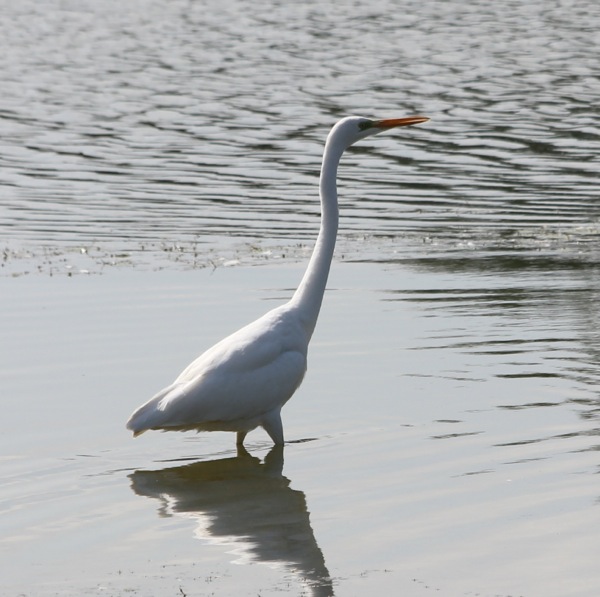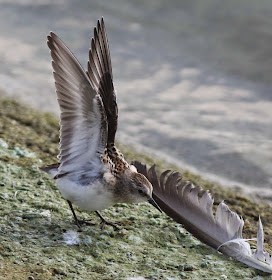Little Stint by Andy Last
Headliners
So here we are in proper autumn now but whilst the east coast has been bombarded by wave after wave of drift migrants with Wrynecks, Barred Warblers and Red-breasted Flycatchers dripping from every bush sadly here in Oxon it's been a disappointingly quiet month. A couple of drift migrants did manage to filter down to our humble county with a Wryneck being reported in the allotments at Letcome Regis on the 17th, incidentally not too far from where a one day twitchable bird of this species was seen last year. However by far the highlight of the month was when a second Wryneck was found at Radley GP's on the 18th. This bird obliged by staying put in the one spot and showing at regular intervals for the rest of the day so that many of the county's birders managed to get to see it. Interestingly it was in exactly the same place as the last one at Radley
several years ago and found by the same person. Unfortunately like most
other county records it had gone by the next day.
Other good birds in the county included the Great White Egret that was back in the west of the county at Pit 60 on the 7th and within the Tar Lakes/Rushy Common complex on the 27th. This species has been seen quite a bit this year and is fast losing it's rarity value though it's of course nice to see, especially in a quiet month.
 |
| Great White Egret Pit 60 (c) Martyn Roper |
A Short-toed Eagle was reported on RBA over Oxford city on the 8th. Had this of course been confirmed then it would certainly be a candidate for the county bird of the year but without knowing who saw it, one can't help but be sceptical.
Also worthy of mention in the "headliners" section is a Red-necked Grebe that turned up at Farmoor on the 25th (probably from Daventry) before going AWOL until the 28th Whilst not a nationally scarce bird, certainly at the county level it's very good. Indeed up to a couple of years ago it would have got everyone heading down to Farmoor to see it but thanks to what has probably been the same bird returning for the last couple of years it no longer has the same impact. Indeed there is speculation that this could in fact be the same bird returning for yet another autumn. Wherever it's from, it's certainly a welcome bird to have in the county.
 |
| Red-necked Grebe (c) John Reynolds |
Talking of good "county birds", up to four Honey Buzzards were reported in what's been a good month for this species: from Farmoor on the 2nd, Otmoor on the 10th, Curbridge on the 13th and Oxford on the 15th.
Waders
As to be expected in September there were quite a few waders passing through the county though perhaps not in quite the numbers that one might hope for.
The two star Curlew Sandpipers from last month remained at Farmoor until the 2nd with a single bird briefly on the 19th. Two Spotted Redshanks arrived and left on the evening of the 1st. Also at Farmoor was a Grey
Plover on the 1st, with a flyover at Grimsbury reservoir on
the 6th and an individual from the first screen on Otmoor on the morning
of the 21st. Two Ruff touched down on Otmoor briefly on the 7th
with a single bird at Farmoor on the 12th being joined by a second on
the 13th, a singleton also arrived on the 30th. Another juvenile Ruff was at the Bicester Wetlands reserve
from the 22nd and one at Grimsbury reservoir was a great record from the north of the county.
 |
| Ruff Farmoor (c) Andy Last |
The first of five Little Stints arrived in Oxon on the 5th at Farmoor reservoir with a second individual
turning
up at Otmoor on the 7th. Another juvenile at the Bicester Wetlands
Reserve on the 13th constituted a first for this super little reserve on
the outskirts of Bicester. A second Stint showed up at Farmoor from the 14th with the last one found at Pit 60 in Standlake on the 21st.
 |
| Little Stint Farmoor (c) Ewan |
Five Black-tailed Godwits spent a day in front of the first screen on Otmoor
taking advantage of the intentional reduction in water levels - thank
you RSPB! The showy juvenile Farmoor Black-wit stayed around for a good part of this month as well.
 |
| Black-wit (c) Wayne Bull |
Gulls and Terns
A juvenile Little Gull was at Farmoor on the 20th. Two Black Terns were at Farmoor on the 2nd with a single bird there on the 19th and 24th. Two Sandwich Terns were also reported from the Oxford reservoir on the 24th.
 |
| Little Gull (c) Lew |
 |
| Black Tern (c) Dai |
Raptors
At least three Marsh Harriers were seen at the RSPB Otmoor reserve for most of September with a single bird at Lockinge on the 21st. The first Hen Harrier of the autumn, a ringtail, arrived on Otmoor on the 22nd but was not seen on subsequent days. The first Merlins of the autumn were seen at Cumnor on the 14th and Lark Hill on the 27th. Ospreys were seen at Farmoor on the 1st-2nd and Kingston Bagpuize on the 3rd.
 |
| Osprey Farmoor (c) John Reynolds |
Ducks
Red-crested Pochard numbers gradually increased at Dix Pit through out the month numbering at least 31 on the 2nd. Wigeon numbers started to creep up during September and the first Pintail was back at Otmoor from the 3rd.
Passerines & Miscellaneous
Redstarts like last month were again recorded in fairly good numbers with birds at Grimsbury Reservoir on the 1st, 5th and 21st with several birds present on Otmoor for the first half of the month with up to 6 birds in Long Meadow on the 3rd. Individuals were also seen outside Burger King in Banbury on the 4th with 4 birds at Lark Hill on the 6th. Singles were also at Muswell Hill near Piddington on the 12th and 14th, Farmoor res on the 14th and at Lollingdon Hill on the 23rd
 |
| Redstart Otmoor (c) Andrew Marshall |
As Whinchat numbers started to tail off during September, Stonechat numbers started to increase with birds arriving on Otmoor and Lark Hill on the 6th.
 |
| (c) Badger |
A Tree Pipit was seen along the upper Cherwell valley on the 5th and one over Grimsbury reservoir on the next day: two of only a handful of records this year. A possible Pied
 |
| Rock Pipit Farmoor (c) Dai |
A Firecrest was a brilliant discovery on Stonefield Common on the morning of the 27th. Four Fieldfares were over Headington on the 26th. As in previous months the Bittern was seen sporadically at Otmoor throughout with 2 birds seen over the reed beds on the 16th
Looking Ahead
Statistically October is the best month of the year for scarce or better birds and looking back a dozen or so years there are some great birds to back this up. The highest count is Grey Phalarope with 5 records, followed by Great Grey Shrike and Great White Egret both with 3 and Yellow-browed Warbler and Sabine's Gull both with 2 records. As far as single records go there are: Azorean Yellow-legged Gull, Baltic Gull, American Golden Plover, Lesser Yellowlegs, Lapland Bunting, Snow Bunting, Spoonbill, Cattle Egret, Ring-necked Duck, Shorelark, Pectoral Sandpiper, Buff-bellied Pipit, Hoopoe and White-rumped Sandpiper. Sadly there have been some duff years with no good October birds so let's hope for a good month!
Back in Time by Paul Chandler
Sunday evening 11th July 1999 we were at a birthday party at Brian Wyatt’s in Wallingford enjoying a few beers and the warm weather. I was involved in a conversation with Geoff Wyatt and Martin Hallam regarding an Elegant Tern at Lady’s Island, county Wexford in Ireland that had been present since the 8th. They were talking about going for it and although I had not seen one before and had not twitched Ireland before I was not that keen on going.
The evening wore on and after a few more beers the thought of a good twitch started to get rather interesting even though we were due at work the following day. Around 21:00 that night a plan was hatched, Geoff had worked out the logistics and it all looked fairly straight forward. There was a ferry to Rosslare from Pembroke in the morning..............however as we had been drinking since early evening and none of us were in any condition to drive. It was suggested that Lew may well want to twitch an Elegant Tern as he was at home and hopefully not drinking, so we decided give him a call.
The phone call went something like this:Geoff: “Hi Lew how do you fancy a trip to Ireland for that Tern”.
Lew: “yeah that sounds interesting, when?”
Geoff: “How about tonight, there is a ferry around 03:00 in the morning”.
Lew: “Short notice but sounds OK, when do we leave and who’s driving”.
Geoff: “Well we can leave as soon as possible and as we are at a party and all rather drunk we thought you might like to drive!”
A slight delay in Lew’s response but he eventually agreed, so the twitch was on. Lew picked us all up we got all our kit together and off we went for a 200 mile drive to get the ferry at Pembroke docks, I guess we must have left around 22:30 'ish as we made the ferry OK. The 4 hour drive for the ferry and another 4 hour trip on the ferry enabled us to get some sleep and sober up somewhat.
We arrived in Rosslare, Ireland, at around 07:00 and got a taxi to Lady’s Island where the bird had been frequenting and within 15 minutes were watching an Elegant Tern that was reasonably easy to pick out. Elegant Terns breed on the Pacific coasts of the Southern USA and Mexico and winter south to Peru, Ecuador and Chile so was regarded as an unusual species to turn up in Western Europe. As well as the Elegant Tern we noted a few Arctic Terns, several Roseate Terns and many Sandwich Tern and also 3 Tree Sparrow. Job done by around 09:00 but Martin and I should have been in work that morning and we were over 300 miles away across the Irish Sea watching birds!
We looked for the nearest phone box to call in our excuses. I managed to swing a day’s leave at short notice and told work that I was in Ireland at that time and I would not make it in anyway. My work colleagues were well aware of my twitching habits and I had no problem with short notice absences. The return ferry journey back was one of those fast jobs that only take a couple of hours. We passed the time on the upper deck observing plenty of Guillemots with young well out at sea, c10 Puffin, a few Razorbills, 100’s of Manx Shearwater and good numbers of Gannets and Kittiwakes. All in all a successful trip and that has been my one and only twitch to Ireland.



No comments:
Post a Comment